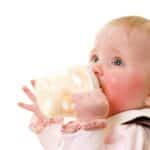The average pregnant woman may notice a yellow and sticky substance leaking from her breasts around their second trimester. If this is your first pregnancy, you might be unfamiliar with this side effect of pregnancy.
It’s colostrum, and it’s filled with the powerhouse nutrients your growing baby needs. However, your little one isn’t here just yet, so this raises the question — is it wrong to squeeze colostrum out?
We discuss what to do if you are leaking colostrum, and how beneficial it is for your baby.
Is Squeezing Colostrum Out Bad?
Squeezing colostrum out is not bad but there are reasons why you may want to avoid it. You will want to be careful when extracting colostrum from the nipples. Do so gently, and only expel small amounts before giving birth.
If you’re producing colostrum later in your pregnancy, for instance around your due date, this may cause you to go into labor, so make sure to keep that in mind. If you are close to your due date and this is happening it would not be a bad idea to get your doctor’s opinion.
To Summarize:
- It is not bad to squeeze out small drops of colostrum during pregnancy.
- There can be risks of premature labor if colostrum is expressed too early.
- Avoid expressing colostrum before you reach 39 weeks.
What Is Colostrum? What To Look For And When?
Once you hit your second trimester, your body begins to produce breast milk for your baby. Colostrum is the precursor to breast milk. It’s yellow, thick, and sticky.
However, if you do not produce colostrum at all, there’s no need to be concerned about your breast milk not coming in. The amount can vary, and it’s not an indication of how much breast milk you’ll be able to produce for your baby after giving birth.
On the other hand, if you’re producing too much, there’s no need to be concerned either. You may use nursing pads to absorb the leakage. You can also try to extract it yourself.
Squeezing Colostrum While Pregnant
Colostrum is filled with antibodies, which can help strengthen your baby’s immune system during his or her early stages of life. It’s even referred to as liquid gold, due to its bright color and abundance of nutrients.
If you’re worried about collecting in excess in a nursing pad after you’ve had your baby, don’t despair. Collecting your colostrum before or after birth will not affect how much you’ll produce after the baby is born.
They will still get the vital nutrients they need. You cannot just ‘run out’, as your body will continue to produce it.
If you find that your continuously leaking, express small amounts at a time. Be gentle, and if you feel any pain around your uterus, stop immediately and call your healthcare provider.
What’s The Safest Way To Expel Colostrum?
Antenatal expression involves expelling colostrum during the few weeks leading up to your delivery date. Always wash your hands before expressing, and store the colostrum in a tight and dry container.
You may also use clean syringes to make feeding your baby this nutritious substance even easier. Ask your healthcare provider if they can provide you with such equipment. You may also visit your local pharmacy.
After giving birth, you may find it more efficient to use a breast pump. It will be a bit more uncomfortable than using your hands. However, it will speed up the process.
View in gallery
Feeding Your Baby After Your Delivery
If you wish to breastfeed your newborn, within six hours of their birth is ideal. It is a learning process, so remember to be patient.
Initially, it may be a frustrating experience for both you and your child, as this is your first time — for both of you! You want to sit at an incline, with your back fully supported. This is typically one of the more comfortable positions.
Take the opposite hand from the breast that you are feeding your child from. Taking that hand, form it into a ‘C’ shape. Cup your breast — your thumb should be on one side, and the rest of your fingers should be resting firmly on the other side.
Keep in mind, don’t touch or stretch out the areola. Stimulate the area by moving your fingers around in a circular motion. You may also squeeze lightly.
Finally, press back and squeeze the colostrum onto the baby’s mouth, or place it into a sterilized container, like the syringes listed above.
However, even if you choose not to breastfeed, deciding to feed your child the colostrum during those first few days of life is crucial. Here’s more information on some of the top benefits for both mom and baby.
The Benefits Of Feeding Your Baby Colostrum
Your baby is growing bigger and stronger day by day, and they need help from their mama’s milk. If you choose to breastfeed, your baby will be consuming an average of one teaspoon of colostrum a day.
This is enough to fuel and energize their little bodies and set them up for success as they hit their monthly milestones.
Adequate Vitamin A
Vitamin A is the fat-soluble compound responsible for maintaining healthy eyesight and organs. Luckily, colostrum contains the proper amount of Vitamin A to keep your baby’s health in check.
Colostrum Cuts Your Baby’s Risk of Jaundice
Jaundice is the yellowing of the skin. It’s common in preterm babies and is due to an infection of the liver. It can also be caused when there’s an excess of bilirubin found in the baby’s body.
The laxative properties of colostrum help to flush this harmful byproduct out of their bodies, reducing their risk of developing this harmful liver disease.
A Stronger Immune System
Colostrum can also help your baby build a stronger immune system, so you won’t have to worry about them coming down with the sniffles after a day trip to the park.
High In Protein
This yellow substance is also a complete meal for your baby, as it’s full of easily digestible protein.
Expressing Colostrum Early On Can Help Build Your Confidence
Milk production can be delayed in certain high-risk pregnancies. For example, if you:
- have a family history of diabetes
- are birthing multiples
- have a BMI over 40
- have had a history of painful breastfeeding
- are currently taking blood pressure medication
- have included a C-section in your birth plan
- are expected to have a premature baby
If you fall into any of these categories, hand expression before birth is so important. However, expressing colostrum early on can increase your confidence in your ability to breastfeed your child. It is, therefore, benefiting you both.
Conclusion: So Is It Bad to Squeeze Colostrum Out?
Now you know what colostrum is, its benefits, and what to do with it if you find that your breasts are always leaking. It’s completely normal, and a beneficial substance for your baby!
Remember to do so in small amounts if you’re wondering whether it’s safe to squeeze colostrum.
Be gentle, and try not to extract the substance from your breasts too close to your due date. The hormone oxytocin is released into your body while expressing, which can induce labor.




![15 Formulas Closest To Breastmilk in [year]](https://cdn.mominformed.com/wp-content/uploads/2021/08/baby-drinking-milk-bottle-feed-150x150.jpg)

